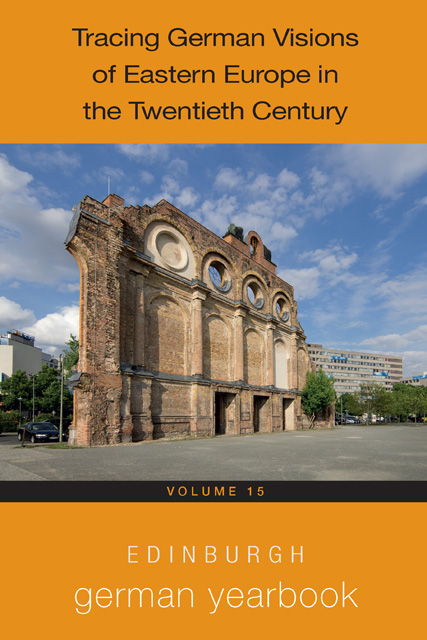Book contents
- Frontmatter
- Contents
- Miscellaneous Frontmatter
- Between Estrangement and Entanglement: An Introduction to German Visions of Eastern Europe in the Twentieth (and Twenty-First) Century
- Colonizing a Central European City: Transnational Perspectives on Kronstadt/Braşov/Brassó in the First Half of the Twentieth Century
- Exile as a Literary-Political Mission: Leo Katz’s Antifascist Bukovina Novel Totenjäger (1944)
- Brunnenland: The Image of the Bukovina in Paul Celan
- “Auch bei uns im fernen Transsilvanien”: The Transylvanian Saxons and the Long Shadow of the Third Reich in the Work of Bettina Schuller
- Through an Orientalist Lens: Colonial Renderings of Poland in German Cinema after 1989
- The Nazi Ghost and the Sinti Woman in Kerstin Hensel’s Bell Vedere (1982)
- The Haunted Landscape of Babi Yar: Memory, Language, and the Exploration of Holocaust Spaces in Katja Petrowskaja’s Vielleicht Esther (2014)
- “dann hüpfe ich auch, komisch und ungeschickt, wie eine Nadel auf einer abgespielten Platte …”: Translational Ethics and Affects in Katja Petrowskaja’s Vielleicht Esther (2014)
- Expanding the Nationalgeschichte: Multidirectional European Memory in Nino Haratischwili and Saša Stanišić
- Reading Photographic Images and Identifying Mnemonic Threads of the Post-Memorial Project in Sie kam aus Mariupol (2017) by Natascha Wodin
- Navid Kermani’s Entlang den Gräben (2018) and Its Readers: Remapping Europe’s East
- Notes on the Contributors
Colonizing a Central European City: Transnational Perspectives on Kronstadt/Braşov/Brassó in the First Half of the Twentieth Century
Published online by Cambridge University Press: 11 January 2023
- Frontmatter
- Contents
- Miscellaneous Frontmatter
- Between Estrangement and Entanglement: An Introduction to German Visions of Eastern Europe in the Twentieth (and Twenty-First) Century
- Colonizing a Central European City: Transnational Perspectives on Kronstadt/Braşov/Brassó in the First Half of the Twentieth Century
- Exile as a Literary-Political Mission: Leo Katz’s Antifascist Bukovina Novel Totenjäger (1944)
- Brunnenland: The Image of the Bukovina in Paul Celan
- “Auch bei uns im fernen Transsilvanien”: The Transylvanian Saxons and the Long Shadow of the Third Reich in the Work of Bettina Schuller
- Through an Orientalist Lens: Colonial Renderings of Poland in German Cinema after 1989
- The Nazi Ghost and the Sinti Woman in Kerstin Hensel’s Bell Vedere (1982)
- The Haunted Landscape of Babi Yar: Memory, Language, and the Exploration of Holocaust Spaces in Katja Petrowskaja’s Vielleicht Esther (2014)
- “dann hüpfe ich auch, komisch und ungeschickt, wie eine Nadel auf einer abgespielten Platte …”: Translational Ethics and Affects in Katja Petrowskaja’s Vielleicht Esther (2014)
- Expanding the Nationalgeschichte: Multidirectional European Memory in Nino Haratischwili and Saša Stanišić
- Reading Photographic Images and Identifying Mnemonic Threads of the Post-Memorial Project in Sie kam aus Mariupol (2017) by Natascha Wodin
- Navid Kermani’s Entlang den Gräben (2018) and Its Readers: Remapping Europe’s East
- Notes on the Contributors
Summary
The following investigation is a case study of literary imaginaries of Braşov/Kronstadt/Brassó, a city that can be considered an exception in Transylvania in the first decades of the twentieth century due to the unusually even demographic split of its citizens. The population of the city was almost equally made up of German, Hungarian, and Romanian inhabitants, unlike other multicultural cities of the region that had dominant Hungarian or (rarely) German populations. Thus, the literary constructions of Braşov in the first half of the twentieth century mirror trilingual imperial and postimperial discourses and allow for the comparison of divergent spatial narratives. Braşov was, next to Sibiu/Hermannstadt/Nagyszeben, the second most important Saxon city in the region, and its imaginary is haunted by German nationalist and colonial thought. It appears in German-language novels of the first half of the twentieth century as a colonized space in the spirit of “intercontinental” German colonialism, but the failed Magyarization measures implemented before the First World War when Braşov was part of the Kingdom of Hungary and the “Romanian conquest” of the city after 1918, when it became part of Greater Romania, were also subject to literary reflection.
The following essay adopts an often required but seldom applied transnational approach to the analysis of the city’s literary imaginaries and focuses on colonialist discourses. It aims to compare different modes of representation as well as the change of narratives over time. My point of departure here is that literature not only mirrors spatial and political discourses, but also shapes them, particularly when the texts concerned are received by a wide public. The texts I have chosen to focus on have each been received by a broad public, whether at the time of publication or afterwards, and exemplify some of the tropes related to space, identity, and colonialist ideology that have accumulated around Braşov. The chronological overview and the transnational perspective adopted in this chapter allow me to reach some general conclusions on the development of colonialist discourses in the case of the city, which I will outline in the final section of the chapter.
Heinrich Zillich’s novel Zwischen Grenzen und Zeiten (Between Borders and Times, 1936) illustrates some of the key ways in which spatial imaginaries of Braşov have been instrumentalized for ideological purposes, but also reveals the limits of such ideological depictions.
- Type
- Chapter
- Information
- Edinburgh German Yearbook 15Tracing German Visions of Eastern Europe in the Twentieth Century, pp. 35 - 55Publisher: Boydell & BrewerPrint publication year: 2022



